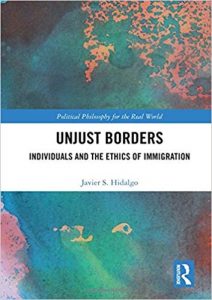In Unjust Borders: Individuals and the Ethics of Immigration, Javier S. Hidalgo makes a clear and engaging case for open borders, arguing that immigration control is unjustly coercive and outlining the responsibilities we have as individuals when it comes to responding to this injustice. This book is essential reading for scholars studying migration and policymakers policing it, writes Mollie Gerver, as well as for all citizens deciding what to do in a world where borders remain closed and movement remains curtailed.
Unjust Borders: Individuals and the Ethics of Immigration. Javier S. Hidalgo. Routledge. 2018.
Shortly before New Year’s 2020, the Byron Burger chain added a brunch menu, a vegan option, a quirky new logo and a revamped interior design with ‘Nordic style and California tones’. It opted for this facelift partly to distance itself from a 2016 PR disaster. That year, in early July, workers reported that it had invited migrant staff members to a fake ‘health and safety” meeting. As staff showed up, immigration officers swept in, eventually arresting 35 migrants from countries including Brazil, Nepal, Egypt and Albania.
Byron Burger’s collaboration with immigration authorities was condemned on social media. Twitter users noted the workers had been paying taxes and improving the UK’s economy, and many workers were from low-income countries, merely seeking to improve their lives. In response, an op-ed in the Independent defended the company’s actions. Not only would Byron have faced fines and closure had it not complied with officials, but the workers were not refugees, and many had used fraudulent documents to obtain work. They were not victims of any human rights violations, and so Byron did no wrong.
Javier S. Hidalgo’s Unjust Borders: Individuals and the Ethics of Immigration provides precise and persuasive arguments for why firms like Byron do commit wrongs when complying with immigration authorities, and why deported workers are victims of human rights violations.
The first chapter of the book (11-29) sets out an argument in support of open borders, starting with the premise that individuals have a presumptive right to be free from coercion. For example, it would be wrong for a police officer to block you from leaving your neighbourhood, as there would be a range of important choices you could not make: you couldn’t work, meet friends, date, attend a political meeting or pray at your out-of-town mosque, church, synagogue or temple. These and other abilities are constitutive of basic freedoms, including freedom of occupation, speech, conscience and association. These same freedoms are undermined when nation states prevent migrants from crossing borders.
Of course, it may seem that moving to another nation state is different, because other states do not owe us the same duties as our own states: if a police officer prevents you from leaving your neighbourhood, the police officer wrongs you as a co-national, but if a UK immigration officer prevents a non-British national from working at Byron, she does not wrong the worker as a co-national. Moreover, the immigration officer might even be helping British citizens, assuming some level of immigration control is necessary to ensure that citizens maintain a given quality of life. Hidalgo demonstrates a flaw in these claims: immigration control entails coercive force, and it is wrong to use coercive force against someone in order to benefit someone else. For example, it would be wrong to assault a job candidate so that one’s daughter gets the job instead. Whatever duties we have towards family and co-nationals do not justify assaulting the innocent (36-37). The UK assaults the innocent by stopping migrants from working in the UK, even if it helps British citizens in the process.
Hidalgo is not an absolutist when it comes to immigration. He does think that immigration restrictions are justified when immigration brings about sufficiently bad consequences overall (57). However, Hidalgo argues that such bad consequences rarely come about in practice. This is because migrants tend to increase wages in the long run, do not have an impact on the state’s overall finances and do not increase crime in general (though they do sometimes). While opening up borders overnight is too hasty, a gradual opening of borders is justified (66-68, 77).

Many people may not be persuaded by Hidalgo’s defence of opening borders. As he notes, only between 1 and 7 per cent of citizens surveyed in seven nations think immigration should increase ‘a lot’. He nonetheless makes another, less controversial, claim: today’s immigration restrictions are largely unjust even by less radical standards. If immigration control is ever unjust – and I imagine many readers of this blog will agree it is – this has implications for what migrants are permitted to do themselves. Hidalgo defends migrants’ rights to use evasion, deception and even harmful force against border authorities, when these actions are a necessary and proportionate means of resisting unjust immigration laws (119). Citizens are similarly permitted to evade immigration enforcement if this too is necessary to help migrants avoid far more harm. For example, if a manager at Byron were aware that migrant workers would be targeted at the next ‘health and safety’ meeting, she would be permitted to tip off the workers, or even provide them a place to hide, helping them avoid arrest.
Controversially, such a manager might even be obligated to evade immigration enforcement when she would face harm herself as a result, such as being fired. This is because humans can have duties to avoid committing an injustice even if the personal costs they would experience are quite high. For example, if a person threatens to shoot your foot unless you shoot an innocent third party’s foot, you should just let them shoot your foot. This is because the duty to avoid actively doing harm is greater than the duty to avoid letting harm occur, and shooting another person is doing harm, while letting yourself be shot is letting harm occur (177). A burger-chain manager complying with authorities is doing harm against migrants, and so should refuse to comply even if this means being fired, as being fired is merely letting harm occur.
Hidalgo presents these and other arguments fluidly, clearly and in an extraordinarily engaging manner. He weaves together logic, case studies, fictional examples and hard data, effortlessly taking the reader through each claim he makes. Even if many readers disagree with some of Hidalgo’s arguments, they might still accept his core conclusions regarding the rights of migrants to circumvent clearly unjust controls, and the duties of individuals to not comply with these controls.
Though the book was compelling and persuasive, there are still some questions worth exploring. Here is one: might it ever be justified to prioritise one’s compatriots over would-be immigrants? In eliciting the intuition that prioritising one’s compatriots is unjust, Hidalgo asks us to imagine choosing between saving two strangers at sea, one a foreigner and one a compatriot (a philosophical example tragically close to the reality of some migrant experiences today). It seems wrong to choose the compatriot, and even worse to choose the compatriot over two foreigners. If so, it seems incorrect to claim that immigration control is justified merely because one is always permitted to prioritise one’s compatriots (37). While this argument is strong, our intuitions regarding the case might change if imagining someone who has already saved many people at sea, and no longer has a duty to save more, perhaps because swimming out again would be very difficult. Given this difficulty, and given her past assistance, perhaps she is permitted to choose who she saves. Those supporting immigration restrictions might claim they are like this potential swimmer: they have already helped a lot of people by paying taxes and foreign aid, and so can choose who they help, restricting immigrants if they wish to.
There are potential responses to the above objection. Citizens in high-income countries have unlikely fulfilled their duties towards outsiders, and so perhaps have a duty to not prioritise compatriots. Most importantly, Hidalgo’s other excellent points make the above objection somewhat irrelevant. He demonstrates that immigration control involves a great deal of coercion, and so even if we can prioritise compatriots before others, it does not follow that we can use outright physical force in doing so. Physical force requires a special justification.
Hidalgo’s analysis of this special justification is somewhat controversial. He claims that physical force in immigration control – i.e. arresting migrants, detaining them and deporting them – is only justified when there are sufficiently bad consequences overall (57). This conclusion seems rushed compared to his later brilliant application of the morality of self-defence. Self-defence, he rightly states, permits the use of force against those liable to harm, which is why migrants are often permitted to use force against border officials enforcing unjust immigration laws (114-37). What he fails to note is that self-defence might permit the use of force against those liable to harm even if this defence does not lead to better consequences overall. Imagine an individual personally exerts weeks of energy digging up a well, and the well has enough water to sustain only herself or three strangers. If three strangers try to access the well, perhaps she is permitted to use force against them, even though saving them might be a better consequence overall. Immigration control is not like defending a well, but it can involve defending resources which are important for an individual’s survival, or at least their wellbeing. If so, then contrary to Hidalgo’s claims, perhaps citizens are permitted to support immigration control that does not lead to better consequences compared to a world of open borders. For example, indigenous groups may be permitted to use force against potential settlers entering their territory, even if better consequences overall might ensue with the settlers’ entrance. The indigenous groups needn’t always weigh the settlers’ wellbeing as equal to their own, so they can prioritise their own interests to an extent.
If individuals are permitted to prioritise their own interests to an extent, this has implications not only for when force is justified, but for when assistance is obligatory. Hidalgo persuasively demonstrates that citizens can be obligated to avoid actively harming migrants, but does not address whether firms are permitted to not hire migrant workers to begin with. Not hiring migrants appears to be merely letting migrants face harm, and so perhaps firms like Byron are permitted to not hire migrant workers at all if the consequences for the firms are serious enough.
At the least, this is a possibility left open by Hidalgo’s argument. Indeed, there are many new possibilities left open, precisely because his analysis is so novel. He moves away from focusing only on the injustices migrants face, and on to the individuals who risk committing such injustices. Given how many people are involved in immigration enforcement – from the owners of high-street burger chains to the immigration officials at airports – there will be numerous debates about whether and when different agents have committed a wrong against migrants seeking to enter, and whether migrants themselves commit a wrong when attempting to do so. Addressing all such individuals means the book is truly comprehensive, not only trying to persuade the reader that borders should be open, but also presenting new debates largely overlooked in discussions on immigration. The book is therefore essential for scholars studying migration and policymakers policing migration. Importantly, it is also essential for citizens deciding what to do in a world where borders remain closed, and where movement remains curtailed.
- This review originally appeared at the LSE Review of Books.
- Image Credit: Photo by David Wood on Unsplash.
Please read our comments policy before commenting.
Note: This article gives the views of the authors, and not the position of USAPP– American Politics and Policy, nor of the London School of Economics.
Shortened URL for this post: http://bit.ly/39tgDwJ
About the reviewer
Mollie Gerver – University of Essex
Mollie Gerver is a Lecturer in Political Theory at the University of Essex and the author of The Ethics and Practice of Refugee Repatriation (Edinburgh University Press).


 Find this book:
Find this book: 
